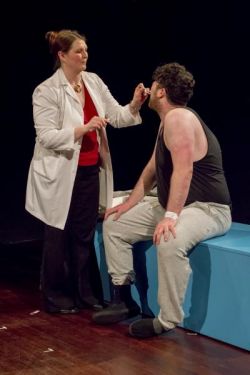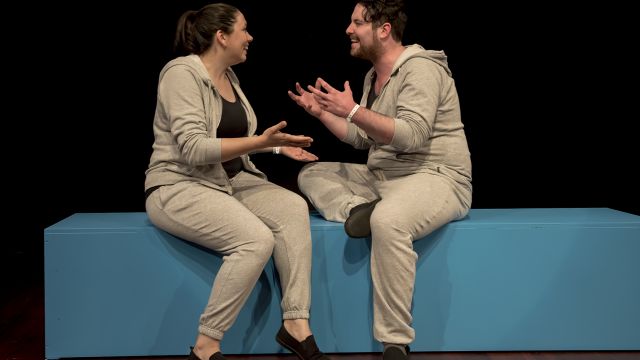The Effect
Megan Dansie is again to be congratulated for bringing a fresh and challenging piece of theatre to Adelaide. Lucy Prebble’s The Effect is a complex work dealing with many themes relating to ethics, love, consent and the complexities of the human mind.
The story centres around two people from vastly different backgrounds - Connie, a psychology student and Tristan a country boy - who find themselves connected through a voluntary drug trial for a new antidepressant. These two are drawn into a complex series of situations as their infatuation grows in a ‘sealed off’ environment. Their attraction becomes increasingly passionate and out of control, as the dosage of the drug gets higher. The question is whether the growing intensity between the two is a side effect of the drug or real. The struggle to keep the trial reliable and in control is the job of Dr Lorna James, overseen by the Pharma company doctor Toby Sealey.
 Megan Dansie is no stranger to the Little Theatre and her knowledge of the space is evident in the effective staging of this production. She has also assembled a talented team of actors that ably tell this emotional and thought-provoking story.
Megan Dansie is no stranger to the Little Theatre and her knowledge of the space is evident in the effective staging of this production. She has also assembled a talented team of actors that ably tell this emotional and thought-provoking story.
The set is extremely simple but effective - a hospital clinical blue used for the two blocks which serve as the main furnishings for the play. Erik Straut’s projection design is clever and gives a medical authority to the set, with questions scrolling up the back screen as they are asked, medical real time stats being used in examining the patients and clever projection to simulate an MRI. The brain projections utilised each time a drug dose was administered were an effective idea but needed to be more brightly projected for the audience.
Lighting design by Richard Parkhill was simple and effective. Staccato lighting made the lovemaking scene tense and heightened the awareness of the audience. Occasionally I felt that the use of decals in the asylum scene made some of the acting fall too much in shadow. Sound design by Tim Allan was very good and the use of fast-paced music heightened the sexual tension between the characters beautifully in the text messaging scene.

The play, whilst technically very clever, is brought to life through the experienced and perceptive acting of David Salter (Tristan), Bronwyn Palmer (Connie), Cate Rogers (Dr James) and Gary George (Dr Sealey).
A standout performance, however, was that of David Salter. The intensity and passion in his characterisation of the emotionally tortured Tristan was only matched by his brilliant physicalization. He utilised the space extremely well and took the audience with him on the journey. His final scene, as he struggles with amnesia, was particularly poignant and played with real understanding of the condition. Salter also has excellent comic timing and brought the humour in this piece to life.
Bronwyn Palmer showed great understanding also of her character and is a pleasure to watch. Her experience in physical theatre truly showed in her powerful confrontation scenes with Salter’s character and she brought realism to the role. Megan Dansie’s use of angular physicality of movement around the set by both characters also made the restrictiveness of the trial environment more effective.
Gary George and Cate Rogers are also to be congratulated for strong performances; although at times this reviewer found some lack of connection between the two characters who were supposed to have has a ‘history’ together. George was effective as the doctor leading the trial and held the stage with authority. Rogers is to be congratulated for her skill in creating a character who is clearly tense for most of the play, struggling to hold inside her own depressive qualities and maintain her own place of humanity and strength. Her monologue with her own internal brain dialogue was extremely clever and beautifully acted.
 The play is quite a roller coaster ride. There are many contemporary issues dealt with- the ethics of big pharma companies and their right to make money out of people’s emotional turmoil and mental illness needing to be seen as a normal part of the human condition being just two.
The play is quite a roller coaster ride. There are many contemporary issues dealt with- the ethics of big pharma companies and their right to make money out of people’s emotional turmoil and mental illness needing to be seen as a normal part of the human condition being just two.
My take away from this clever and challenging play is that we can’t outsmart depression. Even though Lorna is an intelligent psychiatrist and understands in minute detail the complexities of the brain, she too is affected by the condition. Depression doesn’t discriminate and can affect everyone. The Effect is a wonderfully intelligent night of theatre.
Shelley Hampton
Subscribe to our E-Newsletter, buy our latest print edition or find a Performing Arts book at Book Nook.

